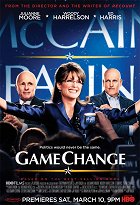Realização:
Jay RoachArgumento:
Danny StrongCâmara:
Jim DenaultMúsica:
Theodore ShapiroElenco:
Ed Harris, Julianne Moore, Woody Harrelson, Sarah Paulson, Ron Livingston, Peter MacNicol, David Barry Gray, Tiffany Thornton, Jamey Sheridan, Bruce Altman (mais)Streaming (1)
Conteúdos(1)
Baseado no bestseller da autoria de Mark Halperin e John Hailemann, Game Change oferece uma intensa perspetiva dos bastidores da campanha de John McCain à presidência dos EUA em 2008, desde a seleção da governadora do Alasca Sarah Palin para vice-presidente, à derradeira derrota eleitoral. Contada pelos olhos de Steve Schmidt, o estratega político da campanha, o filme revisita um momento decisivo na política dos EUA. Dirigido por Jay Roach e escrito por Danny Strong, a equipa por detrás de Recount, o drama vencedor do Emmy. (HBO Portugal)
(mais)Críticas (1)
I have a small problem with the adjective “political” as it is automatically applied to films that are clearly defined in ideological terms and which either condemn or celebrate a particular political view. In contrast to that, Game Change skilfully avoids taking an obvious political stance (even though it could be classified among the films of the post-Obama comedown) and transforms the 2008 election into a rise-to-stardom story of an orthodox woman from Alaska. The filmmakers likably go beyond just presenting Palin behind the scenes (i.e. as the victim of a game played by people more powerful than her) and show us that even a modest girl from the mountains, as the then-governor was, can have an impact on politics. This transformation, portrayed superbly by Julianne Moore, drives the narrative, whose dynamism is also aided by the budding conflict with one of McCain’s campaign advisors (Woody Harrelson). Like Clooney’s more sophisticated The Ides of March, Roach’s film does not engage in a specific ideology (rather fittingly for today’s post-ideological society), but with the mechanism of power itself, which is a shame, because by drawing from an actual historic basis and having its premiere broadcast in the year of the following presidential election, it could have prodded viewers in a certain direction. Only then would this drama have excelled not only due to its cast, but also due to a certain degree of provocativeness, which brings me back to the first sentence of this review, because I consider the ability to encourage civic engagement in the audience to be one of the essential attributes of a political film. But of course there are political films and “political” films. 75%
()

